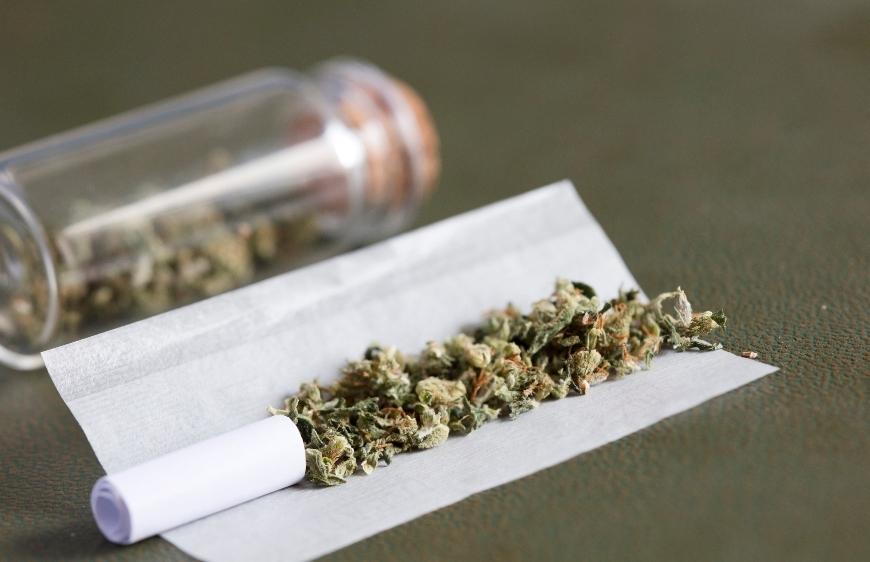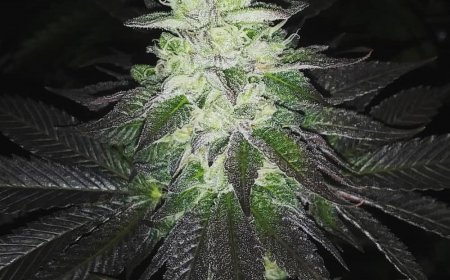Why You Should Use a Filter When Smoking Weed
Discover why you should use a filter when smoking weed, as we explore the key benefits such as improved taste and prioritizing respiratory health.

Why should you use a filter when smoking weed? The answer lies in the numerous benefits that come with incorporating filters into your smoking routine. In this blog post, we will explore various aspects of using filter tips and how they can enhance your overall smoking experience.
From health reasons to improved taste and smell, there are many advantages to using joint filters. We'll discuss different types of filters available on the market, such as solid filters and cardboard filters, allowing you to choose what best suits your preferences.
We'll also debunk the myth surrounding potency reduction when using a filter while addressing its role in reducing lung and throat irritation. Additionally, learn about how filtering smoke cools it down for smoother hits without compromising on flavor or aroma.
In prioritizing respiratory health while enjoying cannabis responsibly, discover why you should use a filter when smoking weed by diving deep into each benefit outlined above. Get ready to elevate your cannabis consumption game!
Table of Contents:
- Benefits of Using Filters
- Types of Filters
- Reducing Lung and Throat Irritation
- Potency Reduction Myth
- Cooling Down Smoke
- Enhancing Your Cannabis Experience with Filters
- Prioritizing Respiratory Health
- FAQs in Relation to Why You Should Use a Filter When Smoking Weed
- Conclusion
Benefits of Using Filters
Smoking cannabis is a popular activity, yet it's essential to prioritize one's wellbeing. Filters can help improve your smoking experience in several ways, so it's important you know why you should use a filter when smoking weed.

Better Filtration
Filters remove harmful substances from smoke, like tar and ash, reducing respiratory issues and discomfort.
Easier on Your Lungs
A joint filter cool down smoke, making it gentler on sensitive lung tissue. This promotes better respiratory health over time.
Potency Preservation
Using filters does not significantly decrease THC potency. Cotton-based filters, glass screens, and activated charcoal filters are all effective options.
Improved Flavor
A joint filter remove harsh chemicals and particulates, enhancing the taste of your cannabis. Some even contain terpene-infused materials that further improve the taste experience.
Overall, using filters when smoking weed offers numerous benefits for both your health and enjoyment. So why not give it a try during your next session?
Types of Filters
Smoking weed can be enjoyable, yet its effects on respiratory health are deleterious; thus, filters offer a solution. That's where filters come in. There are several types of filters available, each with its own benefits and drawbacks. Let's explore some popular options for filtering cannabis smoke.
Glass Tips
Reusable glass tips can be inserted into joints or blunts to provide a smooth draw while preventing ash and plant matter from entering your mouth. They also help cool down the smoke before it reaches your lungs, reducing irritation in the throat and airways.
Cotton Filters
Cotton filters, commonly used in cigarettes, can also be used with cannabis. These disposable filters trap harmful substances found in smoke without significantly affecting THC levels. While they may not be as eco-friendly as glass tips, they offer an affordable option for reducing lung exposure to harmful compounds.
Activated Carbon Filters
Activated carbon filters, also known as charcoal filters, contain small granules of activated carbon that absorb impurities present in cannabis smoke such as tar particles or volatile organic compounds (VOCs). This type of filter is highly effective at removing toxins from smoke without compromising potency or flavor profiles.
Built-in Filters in Smoking Devices
Many smoking devices, such as bubblers, bongs, and vaporizers, come with built-in filtration systems that use water or other materials to filter smoke before inhalation. These devices can provide a smoother smoking experience by cooling down the smoke and removing impurities.
Selecting the Right Filter for You
- Ease of Use: Consider how easy it is to insert and remove filters from your preferred smoking method.
- Cost: Determine whether you prefer reusable options like glass tips or more affordable disposable alternatives like cotton filters.
- Filtration Efficiency: Research which type of filter will best suit your needs in terms of reducing harmful substances while maintaining potency and flavor profiles.
- Eco-friendliness: Opt for reusable options if environmental impact is a concern for you.
Comprehending the advantages and cons of each choice will enable you to select the filter that best meets your individual tastes and needs. Remember that using a filter when smoking weed not only enhances your overall experience but also helps protect your lungs from potential harm caused by inhaling unfiltered smoke.
Reducing Lung and Throat Irritation
Smoking weed can cause irritation to the respiratory system, including coughing fits, sore throat, and other issues; using filters when smoking may help reduce these problems. To reduce these problems, using filters when smoking is a smart move. Filters remove harmful particles found in smoke, making your smoking experience smoother and safer.
Research shows that unfiltered cannabis smoke contains toxic substances like tar and carcinogens that can damage your respiratory system. Filters trap these harmful particles before they reach your lungs and throat, reducing your exposure to toxins.
Types of Filters
- Glass Tips: Made from high-quality glass, these reusable filters provide a smooth draw while effectively filtering out unwanted particles from entering your mouth and lungs.
- Cotton Filters: These disposable filters are commonly used with joints or blunts. They trap ash and other impurities in the smoke but may not be as effective at filtering out finer particulates compared to other types of filters.
- Activated Carbon Filters: These filters use charcoal granules known for their ability to absorb various contaminants from gases like smoke. They are highly effective at reducing lung irritants but may need frequent replacement due to clogging over time.
Using a filter also provides a smoother smoking experience by cooling down hot smoke before it reaches your mouth and throat. Hotter temperatures can increase irritation levels, so cooling the smoke can help reduce discomfort during inhalation.
Filters can help reduce the amount of damaging particles inhaled, but cannot totally remove all risks related to smoking. To further prioritize your respiratory health, consider alternative consumption methods such as vaporizing or edibles which do not involve combustion and produce fewer toxins.
In summary, using a filter when smoking weed is an essential step towards reducing lung and throat irritation. By trapping harmful particles before they reach your lungs, you'll experience less discomfort during inhalation and protect yourself from potential long-term respiratory issues. With various types of filters available on the market, it's easy to find one that suits your preferences and helps make your cannabis consumption more enjoyable while prioritizing your health.
Potency Reduction Myth
One common misconception about using filters when smoking weed is that they reduce the potency of your cannabis. This myth has deterred many from using filters, but it's time to debunk it and understand how filters work to prioritize respiratory health.
Firstly, THC, the primary psychoactive compound in cannabis, is not water-soluble. Therefore, using a filter like a water pipe or bong won't dissolve THC in water and reduce potency. Instead, these filters remove particulate matter and cool down smoke before inhalation.
Studies have shown that using certain types of filters can even increase the efficiency of THC delivery by removing harmful substances without affecting potency significantly. A 2000 study found that water pipes could reduce tar levels while maintaining similar levels of cannabinoids compared to unfiltered methods. Another study by MAPS/NORML showed similar results with activated carbon filtering. These findings suggest that proper filtration may improve overall experience without sacrificing potency.
Types of Filters
- Glass Screens: Small glass pieces placed inside your bowl or pipe to prevent ash and debris from being pulled through into your mouth while inhaling. They make your smoking experience cleaner and more enjoyable without affecting potency.
- Water Pipes: Use water to filter out particulate matter and cool down smoke. They don't significantly reduce THC levels but can make the smoke smoother on your lungs and throat.
- Activated Carbon Filters: Made from carbon granules treated to increase their surface area for better absorption of impurities in the smoke. They can effectively remove harmful substances like tar without affecting THC potency. Popular brands include Smojo, ActiTube, and Purize XTRA Slim.
Using a filter when smoking weed doesn't necessarily reduce its potency. It may enhance your overall experience by providing smoother, cleaner hits while still delivering desired effects. Prioritize respiratory health with proper filtration methods to enjoy cannabis responsibly without compromising on quality or effectiveness.

Cooling Down Smoke
Smoking weed can be a fun and relaxing experience, but it can also be harsh on your throat and lungs. That's where filters come in handy. By cooling down the smoke before it reaches your respiratory system, you can enjoy a smoother and more enjoyable high while protecting your health.
Glass Filters
Glass filters are a popular choice for smokers who want to cool down their hits. The glass acts as an insulator, absorbing some of the heat from the burning cannabis while allowing cooler air to mix with the smoke before inhalation. Plus, some glass filters have intricate designs that create additional pathways for airflow, resulting in even cooler hits.
Water Filtration Systems
Bongs equipped with water filtration systems are another great way to cool down your smoke. As you draw on the bong, the water creates bubbles that force hot marijuana vapor through cold liquid before reaching your mouth and lungs. This results in significantly cooler hits compared to traditional methods like joints or dry pipes.
Dry Herb Vaporizers
If you want to avoid combustion altogether, consider investing in a dry herb vaporizer. These devices heat cannabis to release its active compounds without burning the plant material itself. The result is a cooler, smoother vapor that is less harsh on your respiratory system.
Using Ice or Cold Water
For an even more refreshing experience, try adding ice or cold water to your bong's chamber. Ice cubes will further cool down the smoke by absorbing some of its heat before it reaches your mouth and lungs. Alternatively, using chilled water instead of room temperature liquid will have a similar effect.
Overall, using filters when smoking weed is a smart choice for anyone who wants to enjoy a smoother and more enjoyable high while protecting their respiratory health. Try out different options like glass filters, water filtration systems, dry herb vaporizers or adding ice to your bong - there are plenty of ways to get the perfect smoking experience. So go ahead and experiment until you find the perfect solution for you.
Enhancing Your Cannabis Experience with Filters
Smoking cannabis is all about savoring the flavor and scent, and utilizing filters can raise your experience to a higher level. In this article, we'll explore how filters can improve the flavor and aroma of your cannabis while also promoting respiratory health.
Better Smoke Filtration
Filters remove unwanted particles from the smoke, resulting in a cleaner and smoother hit. This eliminates harsh flavors caused by impurities or combustion byproducts, allowing you to fully appreciate the natural terpenes found in cannabis strains.
Cleaner Smoking Experience
Filters prevent tar buildup on smoking equipment, which can affect taste over time. By trapping particulate matter before it has a chance to stick onto surfaces or enter your respiratory system, filters provide a cleaner smoking experience.
Maintaining Terpene Profiles
- Glass tips: Reusable glass tips made from borosilicate glass are easy to clean and do not affect terpene profiles through chemical reactions with other materials.
- Activated carbon: Activated carbon filters selectively absorb harmful substances such as tars while allowing beneficial compounds like terpenes to pass through, making them ideal for preserving terpene profiles.
- Water filtration: Water-based filters, such as those found in bongs or bubblers, cool down the smoke and trap impurities, preserving terpene profiles. However, some of the water-soluble terpenes may be lost due to this filtration process.
Prioritizing Respiratory Health
Smoking weed has its benefits, but it's essential to prioritize your respiratory health. Inhaling smoke can harm your lungs and throat, so using a filter is crucial. Filters act as a barrier between your lungs and harmful particles found in smoke, like tar and carcinogens. They protect your respiratory system and contribute to a healthier smoking experience.
Studies show that long-term cannabis smokers risk developing chronic bronchitis symptoms like coughing, wheezing, and phlegm production due to irritation caused by unfiltered smoke. Using a filter can significantly reduce these risks by trapping particulate matter before it reaches your lungs.
Benefits of Using Filters
- Maintain lung function: Filters help maintain optimal lung function over time.
- Reduce coughing: A smoother hit with fewer irritants means less coughing during or after smoking sessions.
- Better breath control: Improved respiratory health allows for better breath control when taking hits from joints or pipes - making each session more enjoyable.
Using filters also promotes proper hygiene practices among users who share their smoking devices with others. Sharing joints or pipes without any filtration increases the chances of spreading germs between individuals; however, adding a filter reduces this risk considerably.
While using a filter can significantly improve your respiratory health, it's not a foolproof solution. Combining filters with other harm reduction methods like vaporizing or consuming edibles can further minimize the risks associated with smoking cannabis.
Vaporizers heat cannabis at lower temperatures compared to combustion, producing fewer harmful byproducts and delivering cleaner hits. On the other hand, edibles offer an entirely smoke-free alternative for those looking to enjoy cannabis without any potential lung damage.
Conclusion
Prioritizing your respiratory health when smoking weed is crucial. By incorporating filters into your routine and exploring additional harm reduction methods like vaporization or edibles consumption, you'll ensure that you're taking care of yourself while still enjoying all the benefits that cannabis has to offer.
FAQs in Relation to Why You Should Use a Filter When Smoking Weed
Why use a filter when smoking weed?
Filters reduce lung and throat irritation, cool down the smoke, improve taste and smell, and prioritize respiratory health, making for a better smoking experience.
What do filters do for blunts?
Filters in blunts minimize harmful substances entering your lungs, reduce irritation, enhance flavor and aroma, and ensure smoother hits by cooling down the smoke.
Do you need a filter for a blunt?
While not mandatory, using a filter for your blunt is highly recommended for respiratory health and an overall better smoking experience.
What filter is best for weed?
The best type of filter depends on personal preference, with glass tips being reusable and improving taste, activated carbon filters effectively removing impurities, and cotton filters being affordable but disposable.
Conclusion
Now you know why you should use a filter when smoking weed. Filters when smoking weed offer several benefits, reducing lung and throat irritation, cooling down the smoke, and improving taste and smell. Contrary to popular belief, using filter tips does not reduce potency, so prioritize respiratory health and incorporate filters into your smoking routine.
According to research, smoking marijuana without a filter can lead to respiratory problems, making it important to use one. Filters also help to reduce the amount of tar and other harmful chemicals that enter your lungs, which can lead to long-term health issues. By using a filter, you can enjoy the recreational benefits of marijuana while minimizing potential harm to your lungs and throat.


































































































































